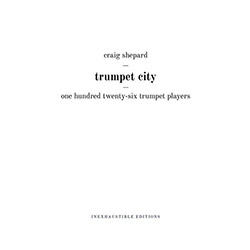
For well over a decade we've been paying attention to the actions of Craig Shepard, a trumpeter, composer, tireless wayfarer and, especially, a keen analyst of any category of surrounding environment. Aside from the nice memory of a gracious personal message included in the promo copy of his book/CD On Foot (Edition Howeg) that I still keep close to me since 2011, Shepard is the type of artist who finds methods to engage our discernment through the subtlest complexities of a "here-and-now" reality — everyday, urban, or bucolic, as you will — that is increasingly difficult for any sympathetic being to perceive nowadays.
It would be nearly impossible for an undocumented audience to imagine Trumpet City as anything other than a large group of trumpeters, dispersed around specific areas of Brooklyn and Manhattan (each of the two CDs in this set contains a recording occurred in those locations), improvising in the middle of chaotic traffic and typically talkative passers-by. Instead, this is a veritable composition where scored parts are handled by individual instrumentalists in a temporal mode left intentionally flexible by Shepard, following the acoustic input coming from the players nearest to them. "The piece starts when one player at the end of the line begins to play. The next player starts when he can hear the first player" says the composer, which is particularly fascinating: a single human constituent effectively giving rise to a spreading signal phenomenon bordering on collective contemplation. In fact, this is the most crucial element of the entire project for yours truly, but every reader will interpret it as they see fit.
The listener at home will take in, almost subconsciously, gradually unfolding lines and notes held in steady overlapping for extended periods of time. They're seldom interspersed with brief outbursts and calls, as if to wake the creature up from an excessive reverie (which, believe it or not, can happen despite the agitation of some mercilessly honking drivers, probably overdosing on daily stress). However, those who authentically identify with sound — something Shepard is undoubtedly aware of — build a barrier against the negative impacts of forced social living while also creating a more dependable communication network at very subtle levels. In that regard, the 126 participants clearly had a one-of-a-kind experience. For us, the mere reviewers of a CD, to be able to at least partially recognize their focus in the midst of supposedly "normal" life is essential for preserving the awareness of a purity that is inexorably evaporating.
Comments and Feedback:
|



